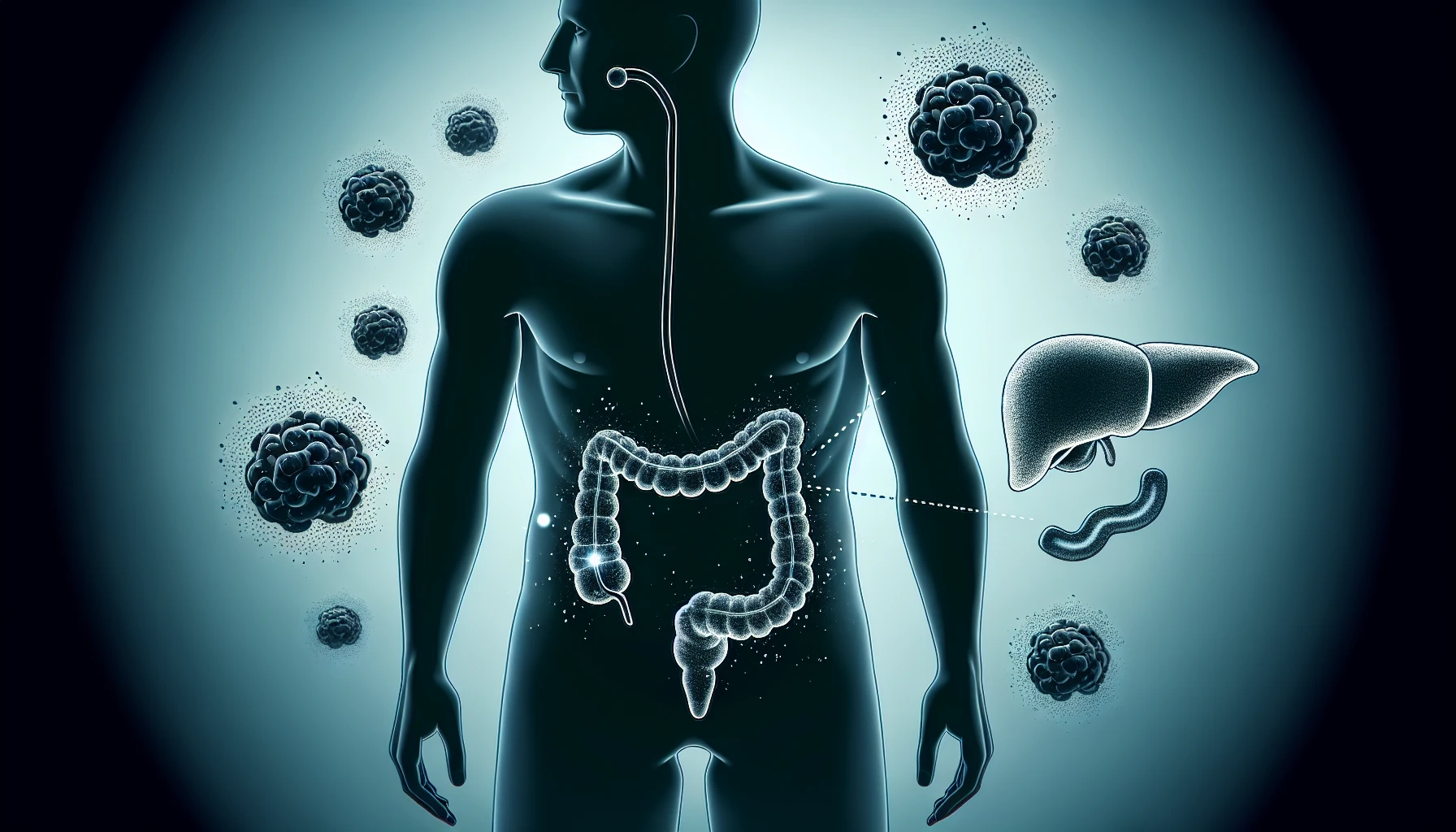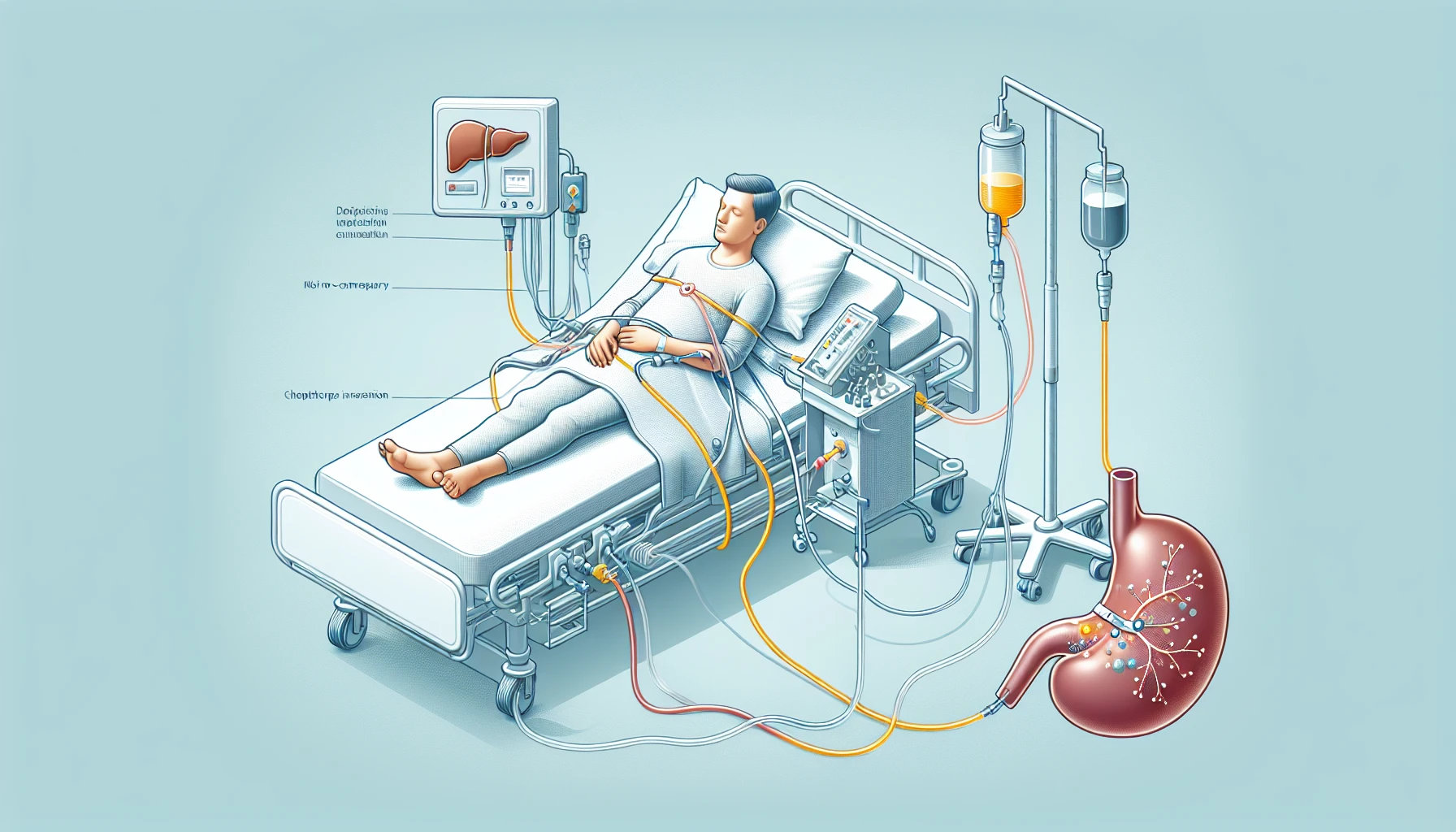Navigating the complex world of stage 4 colon cancer can be an overwhelming and emotionally challenging experience. Despite the serious nature of the disease, a deeper understanding of the condition, its symptoms, and available treatment options can empower patients and their families to make informed decisions and find hope in their journey.
Key Takeaways
Stage IV Colon Cancer is an advanced form of the disease, characterized by metastasis to distant organs and associated symptoms.
Comprehensive treatment approaches typically involve a combination of surgery, chemotherapy, targeted therapy and radiation therapy.
Palliative care provides pain relief as well as emotional support for patients with stage IV colon cancer.
Understanding Stage IV Colon Cancer

Stage IV colon cancer, also known as stage iv colorectal cancer, is the most advanced stage of the disease, characterized by the metastasis of cancer to distant organs, signifying a serious medical condition. This stage is further classified into three stages based on the extent of metastasis and is applicable to both colon or rectal cancer.
Symptoms of colon and rectal cancer that has spread to the liver include:
Blood in the stool
Fever
Pain on the right side of the abdomen
Itching
Jaundice
Stomach swelling or bloating
Weight loss
Fatigue
Sickness or nausea
If treatment options are exhausted, patients may consider participating in clinical trials, which can be found on the National Cancer Institute’s website, a valuable resource provided by the national cancer institute.
The Spread of Cancer
Colon cancer spreads when cancer cells move from the colon to other organs, usually to the:
Liver
Lymph nodes
Lungs
Bones
Brain
The invasion-metastasis cascade involves tumor cells leaving the colon and forming new colonies in distant tissues. The liver’s anatomical proximity and its role in filtering blood from the intestines make it a common site for colon cancer metastasis.
The American Cancer Society offers extensive details on the metastasis of colon cancer. Recognizing symptoms early can dramatically enhance treatment outcomes, making a timely colon cancer diagnosis crucial. Thus, regular symptom checks and transparent communication with healthcare providers are necessary.
Classifications Within Stage IV
Stage IV colon cancer is officially divided into stages IVA, IVB, and IVC, with survival statistics for each stage available on the American Cancer Society’s website. The degree to which cancer has spread is used to differentiate subcategories of Stage IV colon cancer, and your cancer care team will help you understand the classification and treatment options available.
Staging evaluates the spread of cancer by assessing its presence within the body and any extension to other regions. The number and location of metastases have a bearing on the classification of Stage IV colon cancer, offering essential information about the disease’s extent and spread, guiding treatment decisions, and determining prognosis.
Identifying Symptoms of Advanced Colon Cancer
Advanced colon cancer symptoms can vary depending on the affected organs, including changes in bowel habits, abdominal pain, and systemic effects.
Stage IV colon cancer can considerably affect digestive health, leading to symptoms such as:
constipation
diarrhea
rectal bleeding
abdominal pain
changes in bowel habits
These symptoms frequently require treatment and management to maintain the digestive system’s normal functioning.
Changes in Digestive Health
Common digestive symptoms in Stage IV colon cancer include:
Constipation
Diarrhea
Alterations in stool color or shape
Rectal bleeding
Abdominal pain
Abdominal discomfort
A blockage caused by the tumor in the colon may result in abdominal cramping, as well as inflammation or irritation due to the spread of cancer to other parts of the abdomen or pelvis.
Blood in the stool is a common symptom of colon cancer, particularly in later stages, and can be attributed to bleeding from colorectal cancers.
Systemic Effects
Systemic effects such as fever, anemia, fatigue, and loss of appetite can be linked with advanced colon cancer. The disease’s spread to other organs, like the liver, can also cause these systemic effects. Chemotherapy is frequently employed to manage symptoms and extend life in such circumstances, with common side effects encompassing diarrhea, low white blood cell counts, and hypertension.
Surgery, radiofrequency ablation, cryosurgery, radiation therapy, and targeted therapy may also be part of the treatment plan.
Comprehensive Treatment Approaches

Comprehensive colon cancer treatment approaches for stage IV colon cancer often involve a combination of:
Surgery
Chemotherapy
Targeted therapy
Radiation therapy
The objective of each treatment is significant, and patients should consult their doctor to comprehend the best course of action.
Chemotherapy is the primary treatment option when surgery is not effective. Regimens that include a targeting drug targeting either the VEGF pathway or the EGFR pathway may be recommended.
Combining Therapies
Merging therapies can enhance outcomes and boost survival rates for patients with advanced colon cancer. Some usual combination therapies include:
Conventional chemotherapy drugs paired with targeted agents
Drug infusions such as Bevacizumab (Avastin), Ramucirumab (Cyramza), and Ziv-aflibercept (Zaltrap)
Surgical resection followed by systemic therapy
A combination of chemotherapy and radiation therapy
Combination therapies may have potential risks or side effects, such as:
High blood pressure
Extreme tiredness
Bleeding
Low white blood cell counts
Hair loss
Mouth sores
Loss of appetite or weight loss
Nausea and vomiting
Diarrhea
Nail changes
Skin changes
Neuropathy
Fatigue
However, these side effects are generally well tolerated by most patients.
Innovations in Treatment
Emerging treatments and clinical trials provide hope for enhanced outcomes and prolonged survival. Recent advancements in the treatment of stage IV colon cancer comprise developments in surgical and systemic therapies, and the employment of next-generation immunotherapy drugs. Combined immunotherapy with two innovative drugs has shown encouraging clinical activity in treating patients with refractory metastatic colorectal cancer.
Immunotherapy has been demonstrated to be an effective treatment option for stage IV colon cancer by activating the body’s immune system to target cancer cells. Drugs such as pembrolizumab are used to target and attack the abnormal proteins produced by mutating cancer cells. Results from immunotherapy in treating advanced or metastatic colorectal cancer have been promising.
Specialized Care for Metastatic Disease

Specialized care for metastatic colon cancer encompasses the following treatments:
Hepatic artery infusion
Ablation
Embolization for liver metastases
Other non-surgical interventions
These specialized treatments intend to target particular tumors and administer chemotherapy directly to the liver or other affected organs, enhancing the patient’s quality of life and potentially augmenting survival.
Hepatic Treatments
Hepatic treatments involve techniques such as:
Surgical resection
Radiofrequency ablation
Cryotherapy
Hepatic artery infusion pump chemotherapy
Hepatic chemotherapy for Stage IV colon cancer patients involves infusing chemotherapy agents directly into the hepatic artery, targeting the metastatic tumors in the liver and reducing their size.
Tumor ablation, which includes radiofrequency ablation, microwave ablation, cryoablation, or ethanol ablation, eradicates tumor cells and has been demonstrated to provide enhanced oncologic outcomes.
Embolization, another hepatic treatment option, involves injecting a substance directly into an artery in the liver, obstructing the blood supply to the tumor and resulting in its reduction or death.
Non-Surgical Interventions
Non-surgical interventions for advanced colon cancer include:
Neoadjuvant chemotherapy
Targeted therapy
Endoscopic removal of tumors
Nonoperative management in selected patients
Radiation therapy, though not often employed to treat stage IV colon cancer, may be used to ameliorate symptoms and enhance quality of life in cases where the tumor has infiltrated other organs.
Targeted therapy drugs used to treat colon cancer include:
Bevacizumab
Ramucirumab
Ziv-aflibercept
Cetuximab
Immunotherapy has also been successful in treating patients with refractory colorectal cancer. It activates the patient’s own immune system to combat cancer cells.
Palliative Care and Support

Palliative care and support concentrate on managing pain, diminishing symptoms, and catering to emotional and psychological needs for patients with stage IV colon cancer. Pain control, interventions targeting the relief of abdominal symptoms, and support services including counseling, education, spiritual support, and group support are accessible to stage IV colon cancer patients.
Managing Pain and Discomfort
Pain management techniques for stage IV colon cancer patients include:
Anti-inflammatory drugs
Muscle relaxers
Steroid injections
Neurolytic procedures
Intrathecal drug delivery
Spinal cord stimulation
Nutrition also plays a vital role in managing pain and discomfort, with strategies such as ensuring adequate protein and calorie intake, maintaining oral nutrition, and consuming foods rich in electrolytes being beneficial.
Emotional and Psychological Support
Emotional and psychological support can be found through counseling, support groups, and open communication with healthcare providers and family members. Support groups offer a safe and understanding environment for patients to find emotional support, learn from one another, and build a sense of community while addressing family matters such as role changes, relationship changes, and financial worries.
Open communication with healthcare providers allows patients to:
Voice their concerns and feelings, reducing stress and providing a sense of solace
Enable healthcare providers to understand the patient’s needs and tailor their assistance accordingly
Foster trust, empathy, and joint decision-making
Effective communication is crucial in the patient-provider relationship.
The Role of Prognostic Information

Prognostic information, like survival rates, can assist patients and families in understanding the potential outcomes of stage IV colon cancer, but individual factors can significantly affect the prognosis. The 5-year relative survival rates for colon cancer vary based on the stage, with lower rates for more advanced stages.
However, factors such as age, general wellbeing, and response to treatment can influence a person’s outcome with stage 4 colon cancer.
Interpreting Survival Rates
Survival rates offer a broad outlook of outcomes but might not represent recent advances in treatment or individual situations. The survival rate for advanced colon cancer has enhanced over the past decade, with colorectal cancer mortality decreasing by 39.8% in men and 38.8% in women in the United States over the last two decades. However, it is crucial to bear in mind that individual outcomes may vary.
Beyond the Numbers
Personalized care, clinical trials, and a focus on quality of life can help patients navigate the challenges of stage IV colon cancer beyond the numbers. Personalized care considers the individual needs and characteristics of each patient when creating a treatment plan, maximizing effectiveness and minimizing side effects.
Clinical trials play an important role in the treatment of stage IV colon cancer by assessing new treatments, refining existing treatments, and offering personalized medicine.
Summary
Navigating stage IV colon cancer can be a challenging journey, but understanding the disease, its symptoms, and available treatment options can equip patients and families with the knowledge and resources needed to face their diagnosis with hope and resilience. By focusing on personalized care, employing innovative treatments, and emphasizing quality of life, patients can better manage their condition and maintain a sense of control in their lives.
Frequently Asked Questions
How long can you live with colon cancer stage 4?
Stage IV colon cancer has a median survival rate of about 9 months and a 5-year relative survival rate of 14%, meaning that many patients can survive for several years after diagnosis.
Is chemo worth it for stage 4 colon cancer?
Chemotherapy can help relieve symptoms and control the cancer for a time, but it cannot cure stage 4 colon cancer. It can be used as part of a treatment plan to try and manage the disease, but its effectiveness varies from person to person.
What’s the longest someone has lived with Stage 4 colon cancer?
A person has been living with Stage 4 colon cancer for 18 years, proving that it can be done.
Has anyone beaten stage 4 colon cancer?
Miraculously, a stage 4 colon cancer patient beat the odds and recovered after a comprehensive team approach from his Michigan Medicine doctors. Another woman also overcame stage IV colon cancer by having her gastroenterologist prescribe antibiotics and postpone a colonoscopy. Therefore, it is possible to beat stage 4 colon cancer.
What is the most advanced stage of colon cancer?
Stage IV colon cancer is the most advanced stage, characterized by metastasis to distant organs.




Limited Edition
Top 10
Anti-Cancer Juices & Smoothies
Sign up to get access